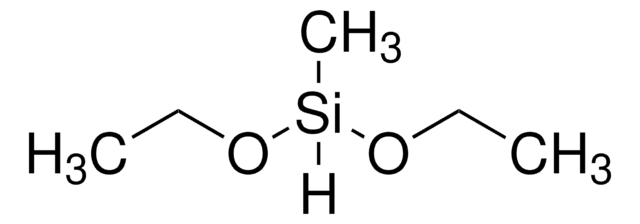679232
Trimethoxymethylsilane
deposition grade, ≥98%
Synonym(s):
Methyltrimethoxysilane
About This Item
Recommended Products
grade
deposition grade
Assay
≥98%
form
liquid
refractive index
n20/D 1.371 (lit.)
bp
102-104 °C (lit.)
density
0.955 g/mL at 25 °C (lit.)
SMILES string
CO[Si](C)(OC)OC
InChI
1S/C4H12O3Si/c1-5-8(4,6-2)7-3/h1-4H3
InChI key
BFXIKLCIZHOAAZ-UHFFFAOYSA-N
Looking for similar products? Visit Product Comparison Guide
Signal Word
Danger
Hazard Statements
Precautionary Statements
Hazard Classifications
Flam. Liq. 2
Storage Class Code
3 - Flammable liquids
WGK
WGK 3
Flash Point(F)
48.2 °F
Flash Point(C)
9 °C
Personal Protective Equipment
Choose from one of the most recent versions:
Already Own This Product?
Find documentation for the products that you have recently purchased in the Document Library.
Customers Also Viewed
Articles
Research involving reactive silicone chemistry has focused on the production of pure silicon and hybrid materials, hydrosilylation, ring-opening and atom transfer polymerizations, polymerizations with controlled stereochemistry, and condensation reactions.
atomic layer deposition (ALD), microelectronics, Mo:Al2O3 films, nanocomposite coating, photovoltaics, semiconductor devices, W:Al2O3 films, composite films, layer-by-layer
Silica is a very popular inorganic nanomaterial used in a wide range of applications including fillers for rubber, catalyst supports, separation media, carriers in food and agriculture, and abrasive/anticaking agents in cosmetics. It is also widely believed to be an important material for biomedical applications for following reasons.
Synthesis of Melting Gels Using Mono-Substituted and Di-Substituted Alkoxysiloxanes
Our team of scientists has experience in all areas of research including Life Science, Material Science, Chemical Synthesis, Chromatography, Analytical and many others.
Contact Technical Service

